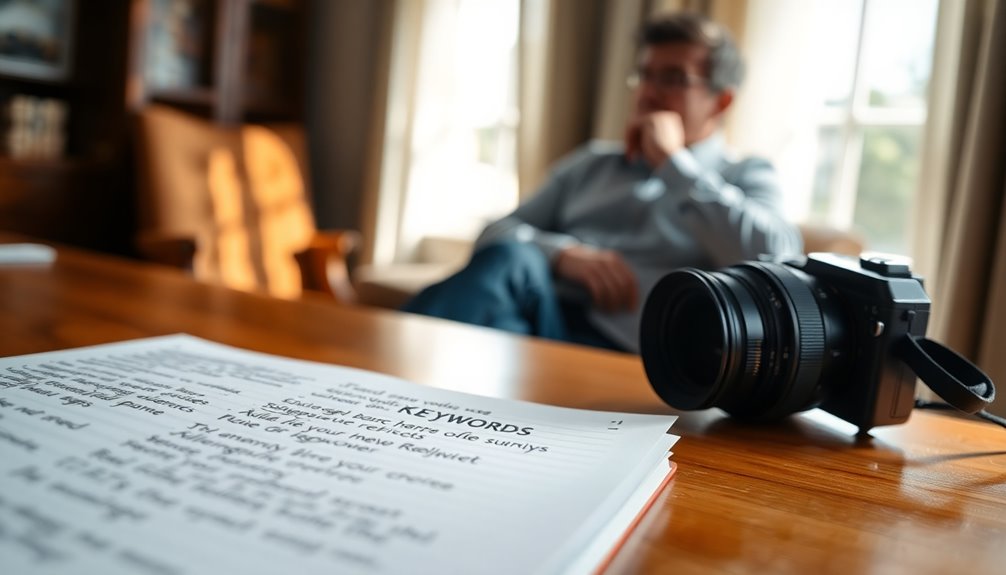To conduct interviews like a seasoned pro, start by preparing thoroughly. Define your goals and use the five Ws and one H for in-depth understanding. Build rapport with small talk and adjust your tone based on your interviewee's cues. Ask clear, impactful questions and follow up to explore deeper insights. Don't shy away from sensitive topics; address them with empathy. Remember to engage in active listening to keep the flow going. After the interview, follow up promptly to express gratitude and reflect on your performance. Keep these tips in mind, and you'll reveal even more effective interviewing strategies ahead.
Key Takeaways
- Prepare thoroughly by identifying story goals, crafting essential questions, and organizing your thoughts ahead of time for a coherent dialogue.
- Build rapport with the interviewee through casual conversation and personal anecdotes to create a comfortable and trusting environment.
- Engage in active listening to ask insightful follow-up questions, which helps uncover deeper insights and strengthens the connection.
- Navigate sensitive topics with empathy and save difficult questions for later in the conversation to foster openness and trust.
- Follow up promptly after the interview to express gratitude, summarize key insights, and keep communication lines open for future interactions.
Preparing for the Interview

Before diving into the interview, it's crucial to prepare effectively. Start by identifying your story goals and angle, which helps guarantee focused and relevant discussions. Use the five Ws (who, what, when, where, why) and one H (how) to gather thorough information that guides your questioning. This structured approach not only aids in formulating prepared questions but also keeps the conversation on track.
Research your interviewee's preferred communication method. Knowing whether they're comfortable with in-person chats or prefer phone calls can greatly enhance the interaction. Aim for in-person interviews whenever possible, as they foster better connections than phone or video alternatives.
Additionally, scheduling interviews with clear deadlines and professionalism shows respect for your interviewee's time and boosts your credibility. As you prepare, think about incorporating open-ended questions. These encourage your interviewee to share more about their experiences and insights, ultimately making the conversation richer. Moreover, understanding the importance of user consent in digital spaces can help you navigate any privacy concerns during the interview process.
Building Rapport and Comfort

Building rapport and comfort during an interview can greatly influence the quality of the conversation. To create a relaxed atmosphere, start your initial outreach via email with casual language, providing context about yourself and the story. This sets a friendly tone right from the start.
Begin your interview with small talk to establish a connection. Engaging in light conversation can help the interviewee feel more comfortable. Here's a simple table to visualize effective rapport-building strategies:
| Strategy | Purpose | Outcome |
|---|---|---|
| Casual Email Outreach | Relaxed atmosphere | Open communication |
| Small Talk | Establish connection | Ease tension |
| Clarify Recording Intentions | Build trust | Feeling safe |
| Share Personal Anecdotes | Enhance understanding | Candid responses |
| Adjust Formality | Create comfort | Openness and honesty |
Additionally, being aware of the importance of self-care practices can help you remain calm and focused during the interview process.
Effective Questioning Techniques

Once you've established rapport and comfort, it's time to focus on how you ask questions during the interview. Employ effective questioning techniques to guide the conversation while allowing for a natural flow. Start with a framework of essential questions that cover key topics without sounding rigid. This sets the stage for an engaging dialogue.
Utilize follow-up questions to clarify or expand on the interviewee's responses. These can lead to richer insights and deeper discussions, revealing important details that might otherwise go unnoticed. If you notice the interviewee being evasive or giving insufficient information, be prepared to adjust your questioning strategy. You might rephrase a question or approach it from a different angle to encourage more candid responses.
Asking similar questions from varied perspectives can help uncover diverse insights on the same topic. This technique not only enriches the discussion but also shows your genuine interest in understanding their viewpoint. Always make sure your questions are clear and easy to understand, so the interviewee can provide the most relevant information. This approach will help you conduct interviews that are both informative and engaging.
Navigating Difficult Topics

Steering through difficult topics in an interview requires a thoughtful approach. You'll want to save sensitive questions for later, allowing rapport to build first, which creates a safe space for open dialogue. Don't shy away from awkward silences; they can prompt your interviewees to share more profound insights.
Embrace Awkward Silence
Awkward silences might feel uncomfortable, but they can actually be powerful tools in your interview toolkit. When you embrace these moments, you allow your interviewee the space to reflect and respond thoughtfully. This is especially important when handling sensitive topics, where a pause can lead to deeper insights.
| Silence Type | Purpose | Outcome |
|---|---|---|
| Reflective Silence | Encourages thoughtfulness | Deeper, more meaningful responses |
| Emotional Pause | Gives time to process feelings | Sharing of personal insights |
| Normalizing Discomfort | Acknowledges the conversation flow | Creates a safe space for sharing |
| Gift Questions | Open-ended inquiries | Captures profound final thoughts |
| Comforting Silence | Fosters a sense of safety | Increased openness from interviewee |
Save Sensitive Questions
When it comes to conducting interviews, timing is everything, especially with sensitive questions. You should save sensitive questions for later in the conversation, allowing rapport to build first. This approach makes interviewees feel more comfortable and open when discussing difficult topics. By starting with lighter questions, you create a safe space, which is vital for fostering trust.
Once you've established a connection, you can gently introduce those tougher subjects. When you do, embrace any awkward silences that may follow; they often encourage deeper reflections and emotions. You might be surprised by the insights that emerge when interviewees have the chance to gather their thoughts.
Also, remember to acknowledge the weight of these topics with empathy. Give your interviewees the time they need to articulate their feelings, as this consideration can lead to more candid responses. It's essential to be mindful of the potential for emotional manipulation, particularly when discussing sensitive matters related to narcissistic parenting. As you approach the end of the interview, consider using a "gift question." This final prompt often elicits valuable reflections on sensitive matters, allowing you to capture nuanced perspectives that may not have come to light earlier.
Build Rapport First
Building rapport is vital for tackling difficult topics during interviews. When you create a safe space, it helps your interviewees feel comfortable and open up during sensitive discussions. Start with small talk; ask specific questions about their recent positive experiences. This not only eases tension but also makes a connection that lays the groundwork for deeper conversations.
As you share anecdotes or relatable experiences, you enhance trust, allowing the interviewee to feel seen and understood. This connection encourages them to be more forthcoming when you eventually engage with challenging issues. Remember, it's important to save sensitive questions for later, giving rapport-building a chance to flourish first.
Let the conversation flow naturally, and don't rush into tough topics. By establishing a personal connection, you'll find interviewees are more willing to discuss those complexities. Additionally, recognizing signs of stagnation in the conversation can help you pivot and address sensitive issues effectively. Finally, consider ending the interview with a "gift question," inviting them to share any thoughts or reflections they might have. This approach can elicit meaningful insights, even on difficult subjects, reinforcing the rapport you've built throughout your conversation.
Managing Interview Dynamics

Effective management of interview dynamics can considerably enhance the quality of your conversations. To keep the discussion focused, don't hesitate to interrupt tangents with phrases like, "Can I pause you right here?" This helps steer the dialogue back on track. Engaging in active listening is crucial, as it allows you to ask questions that lead to deeper insights.
Here are some tips to help you manage those dynamics effectively:
- Organize your thoughts and questions before the interview to guarantee a coherent discussion.
- Take notes briefly to maintain better eye contact and engagement; some prefer pen and paper, while others trust audio recorders.
- Adjust your questioning strategies based on the interviewee's responses to keep the conversation relevant.
- Be mindful of the flow of conversation, allowing room for spontaneous follow-ups that can enrich your dialogue.
- Incorporating techniques from positive reinforcement training can help foster a more open and engaging dialogue, similar to how it benefits dog training.
Following Up and Reflection

After your interview, following up within 24 hours shows your genuine interest and gratitude. Crafting a concise email that highlights key contributions can make a lasting impression. Don't forget to reflect on your performance afterward; it's a great way to identify areas for improvement and enhance your skills for future interviews.
Post-Interview Communication
Following up promptly after an interview is essential for leaving a lasting impression. Within 15 minutes, review your notes to verify accuracy and capture your immediate reflections on the conversation. This will help you gather your thoughts before reaching out.
Make certain to follow up within 24 hours. In your message, express gratitude and reiterate key qualifications that resonate with what you discussed. Highlight three significant contributions or insights from the interview to reinforce your interest. Here are some tips for effective post-interview communication:
- Thank the interviewer for their time and insights.
- Mention any additional questions that arose after the interview.
- Encourage them to reach out if they have further thoughts or clarifications.
- Keep the lines of communication open for future interactions.
Maintaining this connection not only reflects professionalism but also shows your enthusiasm to engage further. By recording the interview accurately, you can reference specific points in your follow-up, making it more personalized. This attention to detail can set you apart and leave a positive impression that lasts long after the interview ends.
Self-Reflection for Improvement
Regularly engaging in self-reflection after an interview can greatly enhance your interviewing skills. Take the time to review your notes within 15 minutes after the conversation. This helps reinforce accuracy and capture immediate reflections, allowing you to identify strengths and areas for improvement.
Consider seeking feedback from colleagues or mentors; their insights can provide alternative perspectives on your performance. Maintaining a follow-up process with interviewees for clarifications or additional quotes not only strengthens relationships but also aids in refining your storytelling. Additionally, understanding the importance of monitoring your performance can lead to significant improvements in your interviewing technique.
To effectively analyze your interview, use the following table as a guide:
| Area of Focus | Reflection Questions |
|---|---|
| Interview Flow | Did the conversation flow smoothly? |
| Question Effectiveness | Were your questions clear and engaging? |
| Listening Skills | Did you actively listen to the responses? |
| Follow-up Process | How did you handle follow-ups? |
| Overall Performance | What went well, and what needs improvement? |
Frequently Asked Questions
How to Conduct an Interview Like a Pro?
To conduct an interview like a pro, start by preparing open-ended questions that encourage deep conversation. Actively listen and ask follow-up questions to clarify and dive deeper into the topic. Build rapport with casual small talk and adjust your tone to match your interviewee's demeanor. Use recording devices and jot down notes to capture key points accurately. Finally, summarize their main ideas for clarity and confirm any follow-up actions to keep communication open.
How to Conduct User Interviews Like a Pro?
To conduct user interviews like a pro, start by building rapport with your interviewee. Engage in casual small talk to create a relaxed atmosphere. Use open-ended questions that encourage them to share their experiences. Actively listen and ask follow-up questions to explore their insights further. Be prepared to handle sensitive topics with empathy, and remember to review your notes afterward to capture key findings and guarantee your data is accurate and actionable.
How to Conduct an Interview Like a Journalist?
Think of conducting an interview like weaving a tapestry; each thread represents a question that adds color and depth. To interview like a journalist, start with open-ended questions that invite stories. Create a comfortable atmosphere with small talk, and listen actively, letting their words guide your follow-ups. Summarize key points to guarantee clarity and trust. Afterward, reflect on your approach, sharpening your skills for the next conversation, just like a craftsman perfecting their art.
How to Conduct Interviews Effectively?
To conduct interviews effectively, start by preparing open-ended questions that encourage dialogue. Actively listen and ask follow-up questions to dive deeper into the interviewee's thoughts. Create a comfortable atmosphere by matching your formality to their demeanor. Summarize key points throughout the conversation to guarantee understanding and build trust. Finally, follow up after the interview for clarifications and to verify quotes, strengthening your relationship and maintaining accurate information.
Conclusion
So, you've mastered the art of interviewing, huh? Just remember, while you might feel like a seasoned pro, every interview is a new adventure—or a potential comedy show. Embrace the awkward silences and unexpected tangents; they'll make great stories later. Follow up and reflect on your experiences, because who doesn't love analyzing their own blunders? With a bit of practice, you won't just conduct interviews—you'll turn them into memorable moments, whether they go perfectly or hilariously wrong!









